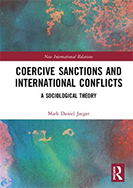Coercive Sanctions and International Conflicts

A Sociological Theory
Author(s): Mark Daniel Jaeger
Series: New International Relations
Pages: 254
Publisher(s): Routledge
Publication Year: 2018
